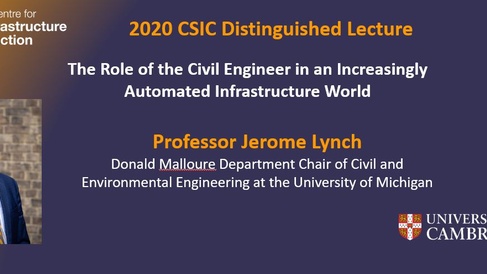
“Civil engineers are best placed to be the de facto leaders of automated infrastructure services going forward into the twenty-first century,” said Professor Jerome P. Lynch, opening the CSIC Distinguished Lecture 2020.
Civil engineers are the designers, constructors and maintainers of the structures and services that truly maintain the common good of our society, essentially providing the quality of life of modern society.Professor Jerome Lynch
This year’s lecture explored the importance of civil engineers taking the role as lead innovators in the design, deployment, and accessibility of our increasingly automated built environments to serve society and advance the common good. Professor Lynch is Donald Malloure Department Chair of Civil and Environmental Engineering and Director of the University of Michigan Urban Collaboratory; he is a member of the CSIC International Advisory Group. The Distinguished Lecture 2020 is now available to watch on the Centre for Smart Infrastructure and Construction YouTube channel.
Presented via Zoom due to physical distancing restrictions resulting from the Covid-19 pandemic, this year’s lecture, titled ‘The role of the civil engineer in an increasingly automated infrastructure world’ was introduced by Professor Lord Robert Mair, Head of CSIC, and Dr Jennifer Schooling OBE, Director of CSIC and delivered by Professor Lynch from his office at the University of Michigan in the US.
Reflecting on the history and current role of the profession, Professor Lynch stated: “Civil engineers are the designers, constructors and maintainers of the structures and services that truly maintain the common good of our society, essentially providing the quality of life of modern society. We are stewards of the environment and more recently stewards of the global climate.”
Professor Lynch considered grand global challenges including population growth, urbanisation and climate change, which require civil engineering leadership to help navigate the application of new innovations and technologies to ensure equitable accessibility to the benefits. The field of civil engineering is radically changing based on the emergence of sensing, data and modes of automation previously unimaginable. As sensors proliferate across our industry, the ability to collect data on the performance of our infrastructure is shedding new light on how infrastructure systems perform – including how they deteriorate over time. Data is at the core of exciting new approaches to modelling our built environments and revealing new ways society uses infrastructure. This brings new opportunities to civil engineers – but, asked Professor Lynch, “are civil engineering firms seizing the opportunities fast enough?”
Together, sensing and data analytics is empowering a new generation of autonomous systems ranging from autonomous mobility services to cloud actuated urban watersheds. While civil engineers have been early adopters of intelligent infrastructure, there has been a shift to data driven methods and cloud computing to create a new class of cyber physical systems (CPS). Automation cannot be underestimated, Professor Lynch warned, and is key to our arsenal of solutions in battling climate change, managing ageing infrastructure and unlocking the capacity of our built assets through CPS.
While there continues to be significant investment in the infrastructure service space, this emerging and valuable field is often led by expertise outside of civil engineering. “There is no strong civil engineering leadership at the helm which is mostly led by the IT sector providing solutions for free or at low cost to generate data,” said Professor Lynch, noting an accompanying lack of transparency regarding use of data and data monetisation. He said: “Our domain expertise will extract true value from data while advancing common wealth over personal wealth. We have a role to play to ensure equitable access, particularly in the role of private financing in this space.”
Citing the thought-leadership report completed with colleagues at the University of Michigan titled ‘In Service to Society’, (Civil and Environmental Engineering, May, 2019), which sets out a “new strategic plan that will better position our profession as the scientific, technological and business leader forming multidisciplinary teams required to tackle the complex societal grand challenges ahead”, Professor Lynch presented a number of infrastructure automation research projects across highways, storm water systems and connectivity that demonstrated the value of CPS in infrastructure.
Acknowledging the gap between available public funding and funding needs for infrastructure – adding to the challenge to deliver sustainable, resilient and net zero infrastructure – Professor Lynch presented a number of new approaches to funding, some including a significant role for civil engineers to be the auditors of performance-based funding initiatives. Impressing the importance of the civil engineering profession to act on new opportunities presented by technological developments and to bring valuable expertise to a rapidly changing infrastructure landscape, he said: “We have the opportunity to unlock the value of data, we have the ability to provide unique insights to that data which allows that data itself to become a valuable asset of the infrastructure space.”
Professor Lynch also expressed the importance of attracting top talent to the profession and the danger of students choosing other areas of engineering perceived as more dynamic. He asked: “Are we losing ground on recruiting talented students? If we do not market ourselves professionally as leaders in this high-tech space we risk being overlooked and losing students who wrongly perceive our profession as old fashioned.” The Distinguished Lecture concluded with a lively question and answer session with the topic sparking interest from many attendees.
- The CSIC Distinguished Lecture 2020, ‘The role of the civil engineer in an increasingly automated infrastructure world’ by Professor Jerome P. Lynch, is now available to watch on the Centre for Smart Infrastructure and Construction's the YouTube channel which also includes past Distinguished Lecutures in the series.
